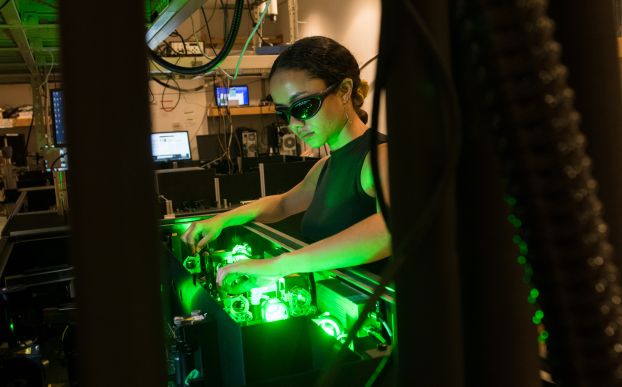Gain new experiences
Explore opportunities in engineering research, education and training tailored to individuals at different career stages. These programs aim to engage and enhance development across various engineering disciplines.
Research Experiences for Teachers in Engineering and Computer Science (RET)
Supports summer research experiences for K-14 educators that foster long-term collaborations between universities, community colleges, school districts and industry partners.
TeachEngineering
Funded by NSF, the TeachEngineering digital library is an educational resource featuring standards-aligned, design-rich curricula.
Engineering for Us All (e4usa)
e4usa offers a variety of resources tailored for K-12 teachers to effectively integrate engineering concepts into their curriculum. These resources include lesson plans, activities and professional development opportunities designed to engage students in hands-on engineering experiences. e4usa aims to enhance teacher confidence and competence in teaching engineering, ultimately fostering a deeper understanding of STEM subjects among students from an early age.
Research Experiences for Undergraduates (REU)
Supports active research participation by undergraduate students in any of the areas of research funded by the National Science Foundation. REU projects involve students in meaningful ways in ongoing research programs or in research projects specifically designed for the REU program.
Skills Training in Advanced Research and Technology (START)
Invites supplemental funding requests from two-year institutions of higher education funded under the NSF Advanced Technological Education, Industry-University Cooperative Research Centers and Engineering Research Centers programs.
Graduate Research Fellowship Program (GRFP)
Supports outstanding graduate students who have demonstrated the potential to be high-achieving scientists and engineers. Applicants must be pursuing full-time research-based master’s and doctoral degrees in science, technology, engineering and mathematics (STEM) or STEM education at accredited U.S. institutions.
NSF Non-Academic Research Internships for Graduate Students (NSF INTERN)
Invites supplemental funding requests to provide graduate students with experiential learning opportunities through research internships in nonacademic settings. Funding supports graduate students on active NSF grants for six months to provide the following:
- Complementary, nonacademic training.
- Professional development experience in preparation for multiple career pathways.
- Opportunities for students from groups that are underrepresented in science and engineering.
Engineering Postdoctoral Fellows (eFellows) Program
The NSF eFellows program, managed by the American Society for Engineering Education, places early-career doctoral recipients in engineering fields in postdoctoral fellowships to conduct research at universities. In addition to hands-on academic research with a faculty advisor, each fellowship cohort will participate in professional development and mentoring activities designed to prepare them for future research careers.
Grant Opportunities for Academic Liaison with Industry (GOALI)
Supports collaboration between institutions of higher education and industry. Under this proposal type, academic scientists and engineers request funding either in conjunction with a regular proposal submitted to a standing NSF program or as a supplemental funding request to an existing NSF-funded award.
Innovation Corps (I-Corps™)
This immersive seven-week experiential training program prepares scientists and engineers to extend their focus beyond the university laboratory, accelerating the economic and societal benefits of NSF-funded and other basic research projects that are ready to move toward commercialization.
Mid-Career Advancement (MCA)
Supports opportunities for scientists and engineers at the associate professor rank (or equivalent) to substantively enhance and advance their research program through synergistic partnerships.
Veterans Research Supplements
Supports alternate pathways to encourage veterans' engagement in STEM research in academia and industry.
Facilitation Awards for Scientists and Engineers with Disabilities (FASED)
Aims to reduce or remove barriers to participation in research by persons with physical disabilities by providing special equipment and assistance under awards made by NSF. It supports developing and demonstrating special equipment that facilitates their work performance.
Build capacity at your institution
Explore opportunities to expand engineering research, education and training capacity at your institution.
Advanced Technological Education (ATE)
Supports partnerships between two-year institutions of higher education, other academic institutions, industry and other entities to improve the education of technicians in science and engineering.
Historically Black Colleges and Universities - Excellence in Research (HBCU - EiR)
Supports research at public and private historically Black colleges and universities to strengthen research capacity and promote engagement with NSF.
IUSE/Professional Formation of Engineers: Revolutionizing Engineering Departments (IUSE/PFE: RED)
Supports radical changes to the training of undergraduate engineering students to help them establish identities as professional engineers with the technical and professional skills needed to solve the complex problems facing society.
Research in the Formation of Engineers
Encourages educational research to create and support an innovative and technical workforce for the future. The research advances our understanding of how people become engineers, explores different pathways to and through degree programs, and examines how changes in engineering education spread.
Engineering Research Initiation (ERI)
Supports new investigators at non-R1 institutions who have yet to receive funding from federal agencies as they initiate their research programs and advance as researchers, educators and innovators.
Engineering Research Centers (ERC)
Supports convergent research, education and technology translation at U.S. universities that will lead to strong societal impacts. Each NSF ERC has interacting foundational components that go beyond the research project, including engineering workforce development at all participant stages, a culture where all participants gain mutual benefit and value creation within an innovation ecosystem that will outlast the lifetime of the ERC.
Industry-University Cooperative Research Centers (IUCRC)
Supports breakthrough research by enabling close and sustained engagement between industry innovators, world-class academic teams and government agencies.
Established Program to Stimulate Competitive Research (EPSCoR)
Aims to enhance the research competitiveness of specific jurisdictions, such as states, territories, or commonwealths, by strengthening STEM capacity and capability through diverse investments in talent development and local infrastructure. The program envisions its jurisdictions as recognized contributors to the national and global STEM research enterprise.
Growing Research Access for Nationally Transformative Economic Development (GRANTED)
Supports the development of the research enterprise to address the complexity of pursuing and managing externally supported research and training activities.
STEM Access for Persons with Disabilities (STEM-APWD)
Invites conference proposals and supplemental funding requests that address the intersections between disability and fundamental science to increase access to and equity in STEM research and training among persons with disabilities.

Partner with us
Explore opportunities to partner with NSF.

